
Panduan Sumo di Kokugikan
Japan TravelYuk, maksimalkan kunjungan Anda melihat turnamen sumo di area Ryogoku, Tokyo, dan jelajahi hal lainnya yang ada di dalam Kokugikan.

Tokyo's Primary Sumo Hall" "Ryogoku Kokugikan" "was completed in 1985 and has seating for over 10,000 spectators and hosts sumo tournaments three times a year (January, May, September), as well as others Used in events such as wrestling, boxing and concerts.
The hall can also be visited when there are no sporting events. The hanging roof that spans the ring is spectacular. You can also learn more about the history and culture of this ancient sport in the on-site sumo museum.
Ryogoku, the part of Tokyo where Sumo Stadium is located, is the center of the sumo world. Many of the sumo stables where the sumo wrestlers live and train together are located in this area. There are also many Chanko restaurants here. Chanko Nabe is a stew that is enriched with all kinds of vegetables and proteins and is very popular with sumo wrestlers.

Yuk, maksimalkan kunjungan Anda melihat turnamen sumo di area Ryogoku, Tokyo, dan jelajahi hal lainnya yang ada di dalam Kokugikan.
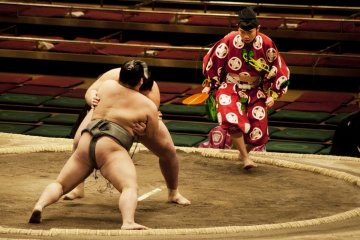
Kunjungi satu dari tiga turnamen sumo di Ryogoku Kokugikan, Tokyo

NOHGA HOTEL AKIHABARA TOKYO is conveniently located in the midst of the electric town Akihabara, also known as the capital of manga and anime. In addition, this neighborhood has an abundance of tech shops, maid cafes and a variety of restaurants. With just a 6-minute walk away from Akihabara station, it provides easy access to explore other areas nearby such as Ueno and Asakusa. This hotel embodies the rich cultures of music, art and food. Nohga’s concept of music is derived from Akihabara’s local history, starting as a district of radio and wireless component merchants in the late 1920s. The artistic and luxurious space throughout the hotel is achieved by featuring art and amenities designed in collaboration with craftsmen from around Japan. As for the food menu, it’s seasonal fresh ingredients are sourced domestically. The glasses and dinnerware served are collaborations with stores in the surrounding area. All 120 non-smoking guest rooms feature an ensuite bathroom with a rain shower, in-room safety box, mini fridge, USB plugs, free Wi-Fi, a high-quality bluetooth speaker and flatscreen TV with original music and film. The lounge area and a compact 24-hour gym can be found near the reception on the second floor. Services include laundry (from 2,750JPY) and a 24-hour front desk with a check-in time of 3PM and check-out time of 11AM. For sightseeing you can rent a Tokyobike for the day (2,000 JPY/day) to explore the vicinity.
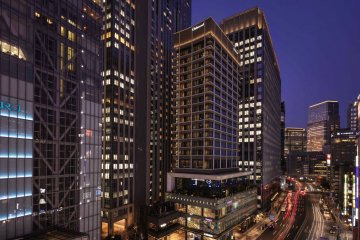
Oakwood Premier Tokyo comes from a brand of standout luxury hotel & service apartments right at the heart of the Tokyo metropolis. It is located in the business hub of Marunouchi with JR Tokyo Station in close proximity. This will allow guests and travelers to easily access the city's extensive transport network and visit various landmarks such as Imperial Palace, Tsukiji Fish Market, Ginza and Shopping District. Boasting 123 luxurious apartments on the upper floors of a multi-serviced complex, each room offers a magnificent view of the city, not to mention all furnished and a fully-equipped kitchen set which is rarely seen in your everyday service apartment. Without doubt, these spacious tranquil retreats are curated to give you the amenities and services of a luxury hotel and a feeling of home. They are good options for both business executives and leisure travelers from one night of a short-stay to a few weeks/months of mid-to-long-term stay.

ANA Holiday Inn Tokyo Bay (previously Dai-ichi Hotel Tokyo Seafort) is a 132-room hotel that will provide visitors to Japan’s capital city with an attractive, fresh option in the midscale space. ANA Holiday Inn Tokyo Bay will join a strong portfolio of 10 ANA Holiday Inn open and pipeline hotels across Japan, and become part of the brand’s global footprint of 1,234 open hotels and 278 pipeline properties.
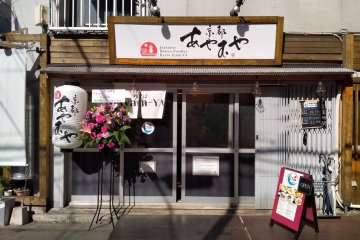
Ayam-YA is a certified halal ramen restaurant found in the Okachimachi area of Tokyo, between Asakusa and Ueno, and not far from Assalaam Mosque. A sister branch in Kyoto also exists.

Bunny Cafe Moff Rell in Tokyo's Chiyoda Ward offers a chance to interact with adorable rabbits. You can make reservations for the cafe by phone, or you can visit and pay at the store before entering. The cafe provides 30- and 60-minute courses, and you can play with or feed the bunnies. If you are unsure about how to treat the rabbits, don't worry! The staff members will kindly explain everything to you. Minimum age is 10 years old.
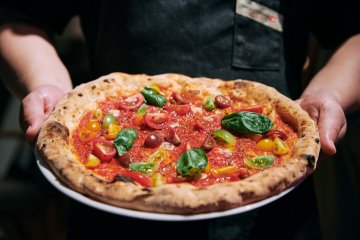
PIZZERIA & BAR NOHGA is an all day dining restaurant interpreting a fusion of “Spanish Italian” cuisine and has a kitchen to table design. There is a casual bar area and restaurant where you can take a peek inside the open kitchen whilst enjoying your meal. Visit the cafe for a range of coffees and teas along with an offering of tapas snacks and seasonal desserts. The cafe also offers an assorted dessert and all-you-can-drink cafe set. Breakfast takes on the art of sharing, where a range of platters are combined with focaccia and your choice of eggs cooked your way. Coming for lunch? Choose from a selection of pizzas, pastas and salads. Each lunch menu is accompanied with homemade soup, iced tea and focaccia. Dinner time offers a range of exquisite tapas and pizzas that can also be shared. Breakfast: 07:00 - 10:00, Lunch 11:30 - 14:30, Cafe 14:30 - 18:00, Dinner: 18:00 - 23:00 with last order at 10pm.
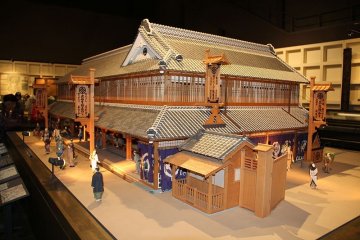
The Edo-Tokyo Museum is a historical museum in Tokyo in the Ryogoku district. The museum was opened in March 1993 to preserve the cultural heritage of Edo. The museum's permanent exhibition illustrates the past of Tokyo (known as Edo until 1869) and covers many features of the capital from the Edo period to the relatively recent decades. In addition to the permanent exhibition, there are regular special exhibitions that deal with Tokyo-related topics. In an interactive way, visitors can discover different aspects of the former Tokyo, such as the way of life of the people, the architecture of the Edo period, the cultural heritage, the political climate, the economic situation and much more. Numerous city models, figurines, and life-size figures are used to illustrate the history of Japan during the Edo period.
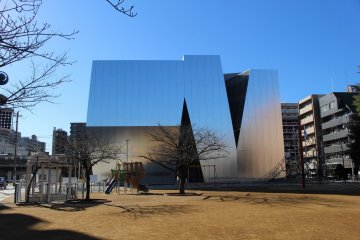
The Sumida Hokusai Museum (すみだ北斎美術館, Sumida Hokusai Bijutsukan) is a contemporary-style museum dedicated to the life & art of ukiyo-e artist Katsushika Hokusai (1760–1849).

The Asakusa Culture Tourist Information Center (浅草文化観光センター, Asakusa bunka kankō sentā) is an eight story building designed by Kengo Kuma. The top floor contains a free observation deck and a cafe with views onto Sensoji temple and the Nakamise shopping street.